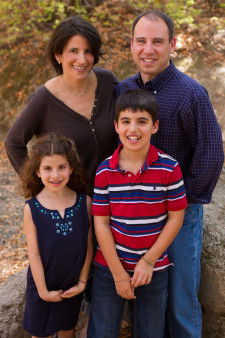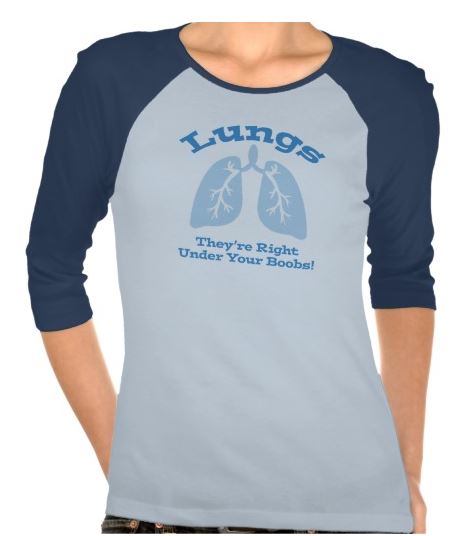How Does a Lung Cancer Diagnosis Change a Life? (a cross post from Psychology Today)
[This article was originally posted on Psychology Today. It was written by Theodora Ross, M.D., PhD. I worked with her on the article. It is Part 2 of a two part series. I posted Part 1 yesterday.]
Lisa Goldman is 43 years old. She has never smoked but was diagnosed with Stage IV lung cancer two years ago. She first got in touch with me after hearing me speak on NPR, a connection discussed in a previous piece. Lisa’s experience has led her to become an advocate for all lung cancer patients—smokers and non-smokers alike, and in this Q&A, I wanted to learn more about how her battle with cancer has shaped her daily life, her views, and her goals.
Collectively, Lisa’s answers reminded me of a quote from the movie Philadelphia, in which a woman diagnosed with AIDS is addressing a courtroom: “I don’t consider myself any different from anyone who has this disease. I’m not guilty. I’m not innocent. I’m just trying to survive.”
Why is it hard for you to discuss healthy living with those who are afflicted with lung cancer or other cancers?
There are three reasons:
First: Because I did everything “right” (exercised, ate healthfully, never smoked, hardly drank) and I got this disease. Meanwhile, I see people living less healthfully all around me doing just fine.
As a fitness instructor, I used to discuss healthy living choices with anyone who would listen. But, given my experience, I am now wary of putting too much emphasis on lifestyle choices as the key to avoiding cancer. I worry it will distract us from examining other possible environmental factors. There are things we as individuals can do to minimize risk, but absolute “prevention” is a myth. We don’t know what causes many cancers, and therefore, we can’t completely prevent them, yet. A healthy lifestyle is worthwhile for many reasons, but it is no guarantee against cancer, even lung cancer.
Second: Because it’s cruel to fellow lung cancer patients with a smoking history. Almost all of them got hooked when they were young, prey to the Svengali marketing tactics of a billion-dollar industry, and many had long since quit by the time they were diagnosed. Making them feel even worse, when they are most vulnerable, is both useless and cruel.
Third: Because it actually detracts from the lung cancer cause. As we discussed earlier, the U.S. Surgeon General has associated smoking with at least 22 other diseases. Singling out lung cancer patients, even ones who smoked, for blame and second-class treatment isn’t right—it isn’t fair to the patients, and it also isn’t fair to many in the general population who mistakenly believe (a) that lung cancer is the only real risk they’re taking if they smoke, and (b) that if they don’t smoke, they’re immune to lung cancer. The public needs to understand there are many health risks associated with smoking.
The bottom line is that as long as we continue to think of lung cancer as a smoker’s disease, all lung cancer victims lose. So long as it’s tainted, patients with lung cancer get looked down upon and the funding dollars don’t flow to research. Instead, a disproportionate amount of anti-tobacco campaign funding is spent on linking smoking to lung cancer. The era of lung cancer being the poster child for the anti-tobacco campaign needs to end. Thus, rather than distance ourselves from lung cancer victims with a smoking history by blaming them for their unhealthy lifestyle, the nonsmoker lung cancer community has chosen to unite with them because we will all benefit from treating lung cancer without blame.
It is clear you have been committed to healthy living your entire life and you were still diagnosed with an advanced cancer. How do you look at your health now? Have you maintained a similar lifestyle to the one you had before your diagnosis?
Some things have changed, and others have remained the same. I still exercise regularly, about 5 times per week, but with a lot less intensity, usually. By my previous standards, I am out of shape. By “average American” standards, I’m probably still fitter than many.
While my scans currently show almost-normal-looking lungs, they are still damaged from the widespread disease that was there initially as well as the intense chemotherapy I received in the first stage of my treatment.
I’m not sure I’ll ever get back to my pre-diagnosis fitness levels. I try to be ok with this, but it’s humbling to not be able to do some of the things I used to do with ease.
What changes have you had to make in order to deal with your illness?
My lifestyle has changed in many ways. My medication often makes me nauseous in the mornings, so I avoid any commitments before noon. The treatment has wreaked havoc on my hormones and metabolism, and I struggle to control my weight. I wear compression socks every day to combat the treatment-related edema. I am careful with my diet, and I have cut out my already minimal alcohol consumption to spare my liver, which is already overworked processing my medications. I visit my oncologist regularly, obviously, but I also sometimes visit a “psycho oncology counselor” to help me process the difficult and unique emotional challenges of living with a diagnosis like this.
I think perhaps one of the most positive changes I’ve made (that I’d recommend to almost anyone) is that I am making more of an effort to incorporate stress–management tools into my life. I’m not great at meditation, but I try to do things like practice yoga, relax in a sauna, paint, take bubble baths—anything that calms me. Sometimes it feels indulgent, but I know now that soothing activities like these may be just as important as a rigorous workout to keep my body healthy.
You’ve been able to survive for more than two years despite your diagnosis. Most people understand that there are people who do survive longer than expected, but I wonder how you are doing at this point.
True. Nobody—my oncologist included—expected me to be alive, let alone doing so well, 2.5 years out from my diagnosis. Of course, the biggest factor in my survival has been that my cancer tested positive for the ROS1 fusion, making me eligible for a remarkably effective targeted therapy called crizotinib (trade name Xalkori).
Of course, my medication crizotinib is not a cure. Just as with chemo, I am told my cancer will eventually become resistant to this treatment, and right now I have very limited options when crizotinib stops working. The future is very uncertain, and I continue to stare down a 5-year survival rate of less than 5% for Stage IV lung cancer patients.
My greatest hope is that crizotinib continues to hold me steady until I have another viable option. I am keeping my eye on clinical trials, and I am part of the effort to launch ROS1-specific research. I pray I can keep “kicking the can down the road” long enough to see my children grow up. If it takes calling out esteemed cancer researchers and advocating constantly to dismantle the stigma plaguing lung cancer so we can improve funding and survival rates, then so be it. I am up to the task.


